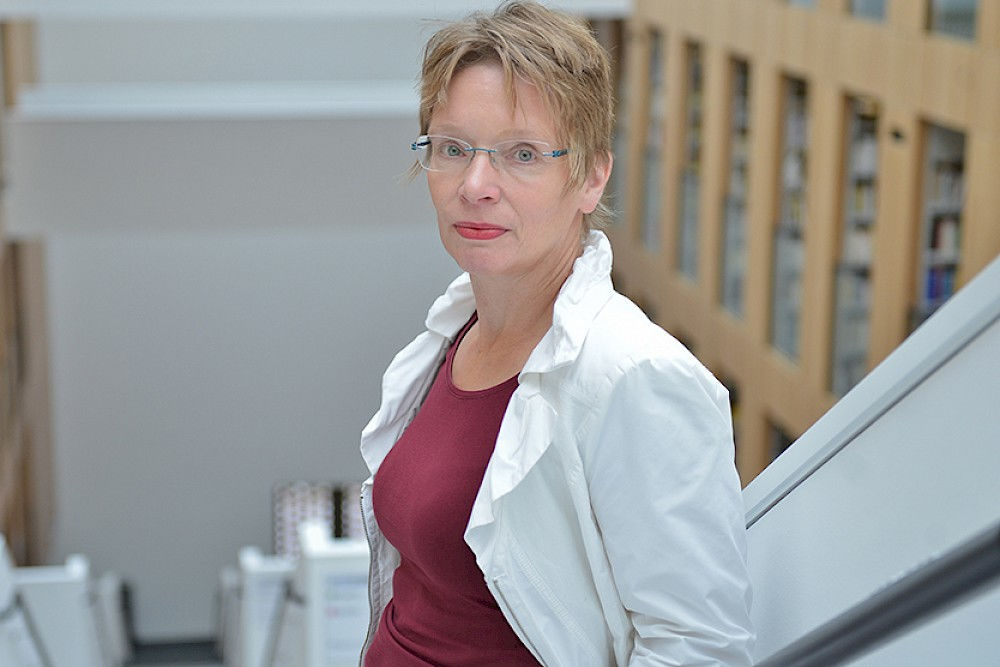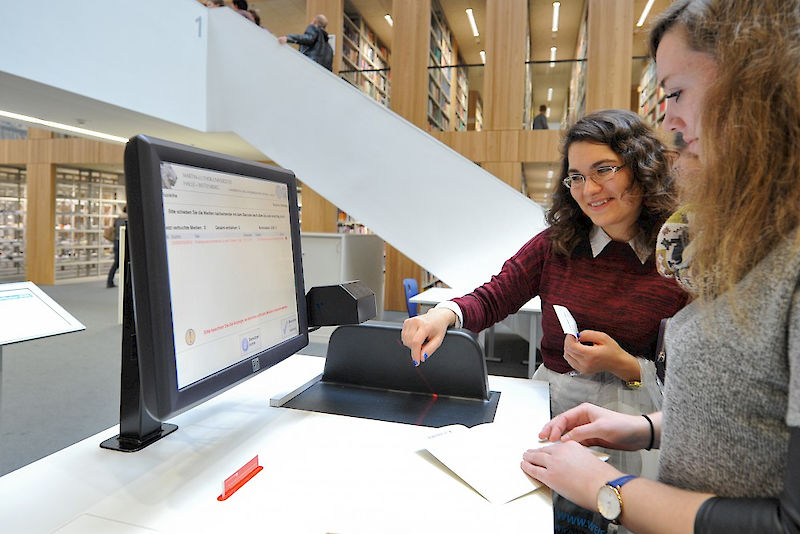ULB goes digital

As one would expect from a native of far northern Germany, Anke Berghaus-Sprengel is not only friendly but also quite frank in her dialogue. She likes to come straight to the point, and journalists appreciate this kind of directness. The new library director always makes time for the media, even though she has precious little of it to spare. Three hours of filming for a two-and-half minute broadcast on regional TV station MDR? Not a problem. Communication is a top priority for Berghaus-Sprengel, not only with the outside world but also in-house: “The staff here need to be able to voice their opinions and contribute their expertise. After all, they’ve been here longer than I have and are more aware of the underlying issues.”
As of 1 April this year, Berghaus-Sprengel is the director of ULB. Her predecessors have left her a legacy of transformation. Take, for example, the amalgamation of all the externally-held collections into a single collection at Halle-Neustadt, or the construction of the new Steintor Campus library that brings 17 branch libraries together under one roof. “There’s a lot for me to build on here. The previous directors put a great deal of effort into merging the library locations, and they also secured huge amounts of external funding for digitising our archival collections. It’s very impressive,” says Berghaus-Sprengel.
Naturally, the new director will also be pursuing projects of her own: “One of the most important tasks ahead is to modernise the IT infrastructure, and then to upgrade our learning environments. We really need to expand our research-related services, which includes everything from open-access publications through to research data management as well as long-term archiving. We also need to focus on personnel development and training. There’s so much work to be done!”

Berghaus-Sprengel was previously in charge of several major projects at Humboldt-Universität zu Berlin, which last saw her managing the introduction of a cloud-based library management system. Her expertise in this area will be crucial to readying ULB for the future, too. “Today, libraries are in a state of flux. They still need to provide the role that’s traditionally expected of them, but since they also operate in the digital domain now, the job description of a librarian is changing very profoundly.”
The people who are using the libraries are a key factor here. “The students of today conduct their research quite differently to the students from, say, ten years ago. Their search methods are fundamentally different. They also want to be able to view our holdings as on-screen PDFs rather than having to locate them on the shelf,” she explains. Library users have been benefitting greatly from the introduction of so-called discovery systems; these provide online access to knowledge from around the world rather than simply referring users to endless other catalogues.
ULB also needs such a discovery system. “We urgently require a system that provides access to full texts and articles online directly from within the catalogue search.”
According to Berghaus-Sprengel, another vital component for an efficient discovery system is “library staff who manage the metadata.” This is because keywords in the catalogue are not enough on their own, she explains – the abstracts and full texts also need to be searchable. Some texts already have metadata associated with them, but “this still needs to be made accessible.”
Her ideas for the reading areas in the branch libraries are also progressive. “We don’t just need reading rooms, we need learning environments. We need to offer a constructive learning atmosphere for groups as well as for individuals.” While every library should continue to offer spaces for quiet reading, they should also offer group study spaces for collaborative project work. On top of that, as many branch libraries as possible are to be fitted with self-service systems.
With all her plans and ideas for the future, Berghaus-Sprengel always has a single focus: the user. To her, there are many more users to be accommodated than just the university’s students. “We need to open up to science and research more,” she states. Initially, this entails upgrading the technology used to provide open-access publications, but one of the biggest challenges ULB is facing in the longer term is the management of research data. The data cited in an academic publication should ideally be accessible directly from within that publication. “That’s actually a widely-voiced request, and we need to respond to that. Sound scientific practice means that all research data should be easily verifiable.”
For this to be possible in the future, ULB will need to be able to access such data, store it, and make it available electronically. “This means we’ll need to introduce a complex system for managing access rights.” This ambitious project involves extensive planning and dialogue with the relevant IT departments. Ultimately, the idea is to preserve the data for eternity – much like the books that came before.
Vita
Anke Berghaus-Sprengel was born in 1962 on the island of Norderney. She is a trained bookbinder and a graduate from the University of Hanover, where she studied history, philosophy and German literature. She started her career in the world of libraries at the Berlin Central and Regional Library (ZLB), where she advanced to be the head of the data processing department. For the following ten years, Berghaus-Sprengel was employed at the library of Humboldt Universität zu Berlin (HU). In her time as director of the HU library she was also head of the branch libraries and controlling departments and oversaw several major projects for the introduction and automation of new library systems.
